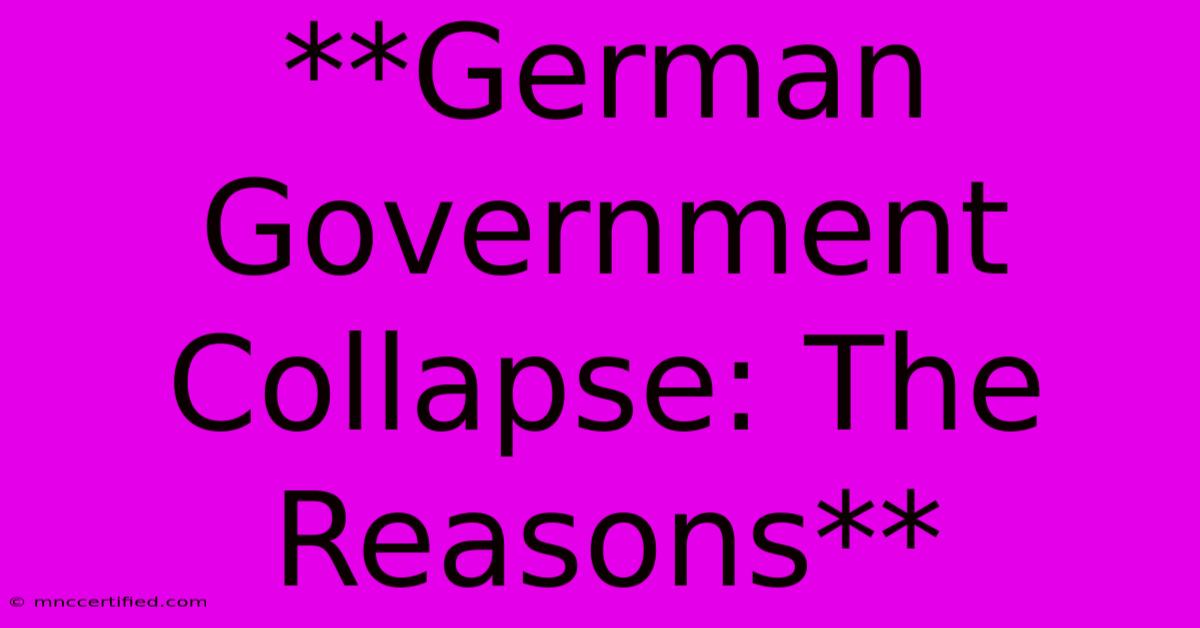**German Government Collapse: The Reasons**

Table of Contents
German Government Collapse: The Reasons Behind a Historic Event
On April 19, 2023, German history took a dramatic turn as Chancellor Olaf Scholz's three-party coalition government collapsed. This unprecedented event, marking the first time a German government has fallen in nearly 75 years, has left the country in a state of political uncertainty. The question on everyone's lips: what led to this unexpected collapse?
The roots of this crisis can be traced back to a complex interplay of factors, including policy disagreements, internal party struggles, and external pressures. While the immediate trigger was the controversial decision to allow the construction of a new liquefied natural gas (LNG) terminal in the port city of Brunsbüttel, this was merely the tip of the iceberg.
The LNG Terminal Controversy
The Brunsbüttel LNG terminal was seen as a crucial step towards Germany's energy independence following the Russian invasion of Ukraine. However, it sparked a fierce debate within the governing coalition. The Green Party, a strong advocate for environmental protection, raised concerns about the project's potential impact on climate change and the surrounding ecosystem. The Free Democratic Party (FDP), on the other hand, pushed for the terminal as a vital source of energy security. This disagreement exposed the deep ideological divide within the coalition and highlighted the difficulties in finding common ground on key policy issues.
Internal Party Tensions
Beyond the LNG terminal, internal tensions within the coalition parties played a significant role in the collapse. The Social Democratic Party (SPD), led by Chancellor Scholz, faced increasing pressure from its left-wing factions, who felt that the party was sacrificing its core values for the sake of coalition unity. This internal friction made it difficult for the SPD to maintain a strong and consistent position on various issues, further eroding the coalition's stability.
External Pressures
The German government also faced significant external pressures, most notably from the European Union (EU). The EU's insistence on strict fiscal policies and budget constraints put considerable pressure on the German government to balance its ambitious social spending agenda with the need for fiscal prudence. This tension further fueled the internal divisions within the coalition, as each party sought to defend its own priorities.
The Final Straw
While the LNG terminal controversy and internal party tensions created a volatile political atmosphere, it was ultimately the failure of the coalition to reach a consensus on a crucial policy decision that triggered the collapse. The parties failed to agree on a plan to reform the country's asylum system, a major issue with significant political and societal ramifications. This impasse, coupled with the existing tensions, proved to be too much for the coalition to overcome, leading to its ultimate demise.
Implications for the Future
The collapse of the German government has profound implications for the country's political landscape. New elections are likely to be held in the near future, creating a period of uncertainty and potential instability. The outcome of these elections will have a significant impact on Germany's domestic and international policy, particularly in light of the ongoing war in Ukraine and the need for strong leadership in a rapidly changing global environment.
Key Takeaways:
- The German government collapse resulted from a complex interplay of policy disagreements, internal party struggles, and external pressures.
- The LNG terminal controversy highlighted the ideological divide within the coalition and the difficulties in finding common ground on key policy issues.
- Internal tensions within the coalition parties, particularly the SPD, further eroded the coalition's stability.
- External pressures from the EU, particularly on fiscal policies, added to the strains on the coalition.
- The failure to reach a consensus on asylum reform ultimately proved to be the final straw, triggering the government's collapse.
The German government collapse marks a significant turning point in the country's political history. The reasons behind this event provide valuable insights into the challenges faced by modern democracies in navigating complex political and societal issues. The future of German politics remains uncertain, but the lessons learned from this historical event will undoubtedly shape the country's political landscape for years to come.

Thank you for visiting our website wich cover about **German Government Collapse: The Reasons**. We hope the information provided has been useful to you. Feel free to contact us if you have any questions or need further assistance. See you next time and dont miss to bookmark.
Featured Posts
-
Independent Insurance Agents Of Arkansas
Nov 08, 2024
-
Watson Insurance Gastonia North Carolina
Nov 08, 2024
-
Trump Election Kimmel Other Hosts React
Nov 08, 2024
-
Watch Man United Vs Paok Europa League Live
Nov 08, 2024
-
Chelsea Starting Xi Noah Match
Nov 08, 2024